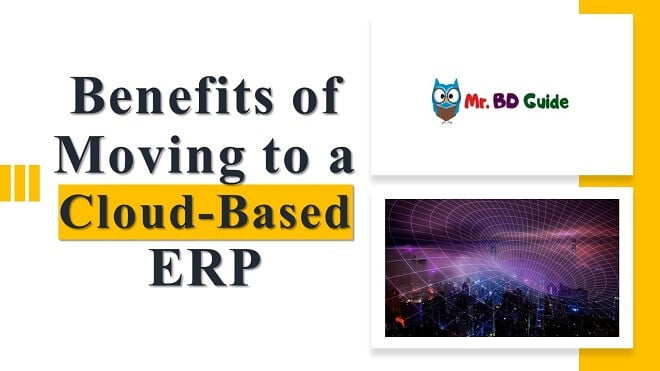08 Benefits of Moving to a Cloud-Based ERP

Let’s discuss the 08 Benefits of Moving to a Cloud-Based ERP. During the last few years, a significant shift has occurred in how businesses operate. Technology has enabled organizations to move from the traditional model of having everything stored on-site to a cloud-based system.
As a result, cloud computing has become increasingly popular, and for a good reason. According to recent statistics, up to 80% of businesses will use cloud-based ERP systems by 2025.
08 Benefits of Moving to a Cloud-Based ERP
If your business isn’t currently using a cloud-based enterprise resource planning (ERP) system, now is the time to make the switch. Here are 08 benefits of moving to a cloud-based ERP system:
1. Increased Scalability
A cloud-based ERP system is easier to scale than an on-site system. If your business grows, you can add more users to your account. With an on-site ERP system, you need to invest in additional hardware and software to accommodate more users.
With a cloud-based ERP system, businesses can quickly scale up or down as needed. They’re also not limited by the number of users accessing the system, which is ideal for companies with employees working remotely or in different locations.
Cloud-based ERP systems also allow employees to access and share information easily. For example, most systems include a central repository where all the data is stored. This makes it easy for employees to find the information they need.
So whether you are looking to move to a cloud-based ERP system or looking to implement the JDE CNC solution for your business, you can outsource these services from resellers and other trusted providers.
2. Improved Collaboration
Here’s the first one among other 08 benefits of moving to a cloud-based ERP. Another key benefit of using a cloud-based ERP system is that it can improve collaboration between employees. With an on-site ERP system, employees often work with different versions of the same data, which can lead to discrepancies.
With a cloud-based system, employees always work with the same data, reducing the risk of errors. Cloud-based ERP systems also allow employees to access data from anywhere, which can be a major advantage for businesses with remote workers.
In addition, cloud-based ERP systems offer features that facilitate collaboration, such as chat and discussion forums. These features allow employees to communicate with each other in real-time, regardless of location.
However, it’s important to note that not all cloud-based ERP systems are created equal. Some offer better collaboration features than others. When choosing a cloud-based ERP system for your business, select one that offers the collaboration features you need.
3. Reduced Costs
One of the main reasons businesses switch to a cloud-based ERP system is that it can help reduce costs. With an on-site ERP system, businesses must invest in hardware, software, and IT infrastructure. They also need to pay for maintenance and support.
With a cloud-based ERP system, businesses only need to pay for their software and services. They don’t need to invest in hardware or IT infrastructure, and they don’t need to pay for maintenance and support.
Additionally, cloud-based ERP systems can help businesses save on energy costs. On-site ERP systems require significant power to run, which can add up over time. Cloud-based systems, on the other hand, are powered by the provider, which can help businesses save on energy costs.
However, it’s important to note that not all cloud-based ERP systems are less expensive than on-site systems. So be sure to compare the costs of different systems before deciding.
4. Enhanced Security
Despite the common misconception, cloud-based ERP systems are more secure than on-site systems. With an on-site system, businesses must invest in their own security infrastructure, which can be costly. They’re also responsible for protecting their data from cyberattacks.
With a cloud-based system, businesses benefit from the provider’s security infrastructure. Providers invest heavily in security and have teams of experts dedicated to protecting their data. As a result, businesses that use a cloud-based ERP system can rest assured knowing their data is safe.
When choosing a cloud-based ERP system for your business, select a provider with robust security features. But don’t just take the provider’s word for it—be sure to research the provider’s security infrastructure before making a decision.
It was our 4th one among other benefits of moving to a cloud-based ERP solution.
5. Increased Efficiency
Another key benefit of using a cloud-based ERP system is that it can help businesses increase their efficiency. On-site ERP systems can be complex and difficult to use, leading to inefficiencies.
Cloud-based ERP systems are designed to be user-friendly and easy to use. They offer a variety of features that can help businesses streamline their operations, such as automated tasks and real-time data. As a result, businesses that use a cloud-based ERP system can increase efficiency and get more work done in less time.
When choosing a cloud-based ERP system for your business, select one that offers the features you need to increase efficiency. And be sure to ask about the provider’s customer support—you’ll want to choose a provider that offers 24/7 support if you run into any problems.
6. Cost Effective
Not only is it easier to scale a cloud-based ERP system, but it’s also more cost-effective. You need to pay for the additional hardware and software with an on-site system. With a cloud-based system, you simply pay for the additional users. Hence, you must select a provider that offers a pay-as-you-go pricing model. It will allow you to scale your account as needed without breaking the bank.
7. Increased flexibility
Cloud-based ERP systems offer several advantages over on-site systems, one of the most important being increased flexibility. With a cloud-based system, businesses can access their data from anywhere in the world. All they need is an internet connection.
Another advantage of using a cloud-based ERP system is that it’s easy to implement. On-site ERP systems can be complex and time-consuming to implement. But with a cloud-based system, businesses can get up and running quickly.
Conclusion
There are many benefits of moving to a cloud-based ERP system for your business. From increased security to improved collaboration, a cloud-based ERP system can offer a variety of advantages over an on-site system.
When choosing a cloud-based ERP system for your business, select one that provides the features you need to increase efficiency and improve collaboration.


![What Is The Best Strategy For E-commerce SEO [Definite Guide] 4 Best Strategy For E-commerce SEO](https://mrbdguide.com/wp-content/uploads/2021/11/61837b889bdf0-390x220.jpg)

![Salesforce Lightning vs Classic [Compared by Experts] 6 Salesforce Lightning vs Classic](https://mrbdguide.com/wp-content/uploads/2022/03/GetPaidStock.com-6242ee35994d5-390x220.jpg)